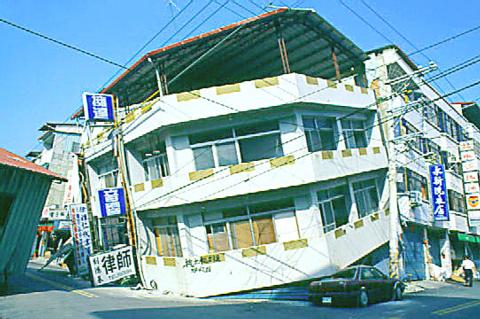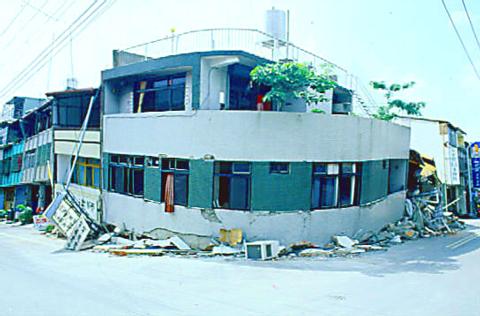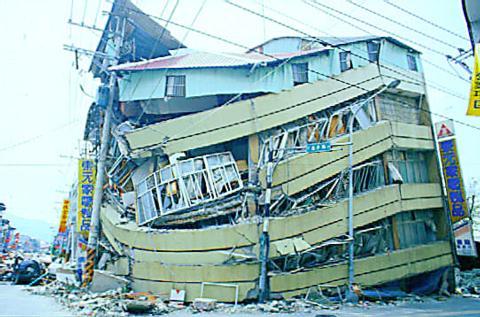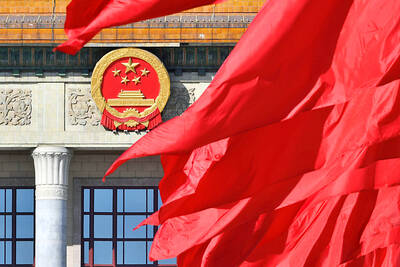Forget the salad oil cans and the curse of the 12-story buildings: what really reduced Taiwan's newest buildings to a mess of twisted rubble and rebar were "soft stories" and watery concrete.
This was the verdict of structural engineers from EQE International, a California-based firm specializing in earthquake proofing, and Chern Jenn-chuan (陳振川), president of the Taiwan Construction Research Institute (台灣營建研究院).
"I used to tell trainee engineers never to have soft stories in their buildings. If they came to Taiwan and saw what had happened they would never build a soft story again in their life," said Ken Mark, EQE associate and head of the four-man investigation team the company had sent specially to Taiwan.

PHOTO: CHRIS TAYLOR, TAIPEI TIMES
A "soft story," Mark explained, is a story in the building that has substantially less resistance, or stiffness, than the stories above or below it. Typically, in Taiwan, soft stories can be found on the ground floors of many buildings, where the shear walls -- walls designed to hold the adjacent columns in place and to absorb the horizontal motion stress of the tremors - -- are replaced by huge plate-glass shop windows. According to TCRI's Chern, who is also chairman of National Taiwan University's civil engineering department, the problem is compounded by the fact that it is the ground floor that is also subject to the greatest stress during a quake.
"The collapse of the `salad oil can building' was nothing to do with those oil cans," Mark said. "It was a classic case of the soft story effect. The first floor columns buckled and the whole thing settled one floor." The salad oil cans came to light in cross-beams that joined two tower blocks together, but which had no load-bearing role.
Mark said that the soft story phenomenon was also behind the spectacular collapses of many high-rises that left the main part of the building intact, but keeled over at some extraordinary angle.

PHOTO: CHRIS TAYLOR, TAIPEI TIMES
Why then were so many of these collapses occurring in 12-story buildings? Was it, as the local media suggested, a result of seismic waves hitting just the right resonant frequency to take them out? Professor Chern dismisses this as bordering on superstition. "Basically Taiwan has a lot of 12-story buildings, especially central Taiwan. You hardly see any 20-story high-rises in those areas hit by the quake. The reason for this is that buildings under 50 meters in height don't have to go to a special engineering committee to be approved, so 12 stories is just right." Approval of a structure by qualified structural engineers, and correct enforcement of the building codes, is the crux of the problem, Chern believes.
The actual codes themselves are quite rigorous -- for new buildings. "The Taiwan building code follows the 1991 UBC (Universal Building Code), as followed in California, but with additional parts from the Japanese code," EQE's Mark said. "It's a good code."
But the earthquake structural design code only came into force in 1982, and buildings put up before then may be particularly vulner-able. As the host of crumpled modern apartment blocks shows, a good code is no use unless it's enforced.

PHOTO: CHRIS TAYLOR, TAIPEI TIMES
"The crucial thing is enforcement," Mark said. "One of our engineers, Y.Y. Chu, works as an inspector with the San Francisco building department. He saw a lot of violations here."
Professor Chern is particularly damning of some of his fellow engineers, and the professional associations to which they belong. "In 1997 we had 6,300 registered civil engineers. 300 of them are working in their own consultancies, and 2,800 are employed by building contractors. That means that the other 3,300, or more than half, are possibly renting their licenses."
Asked to explain further, Chern said that it was common practice for an engineer to rent his engineer's license to a building contractor, so that the contractor could then claim the architectural drawings had been approved by a qualified engineer, without the engineer even having seen the blueprints.
Chern sees the problem as stemming from the way the engineers' professional associations are run. "When they elect a president of the association, the candidate who favors license-renting will get all the votes from those people and win the election, and then he won't be willing to do anything about the problem."
Of course engineers aren't the only ones up to dodgy tricks: Chern said the construction industry is riddled with problems from top to bottom. Even the concrete has problems.
"In Taiwan we have quite narrow columns with a lot of rebar in them. This makes it difficult to pour the concrete and get it through and into all the spaces between the bars. Just imagine it -- you usually have a small contractor doing the pouring, maybe five men with one pumping car, with two doing the vibrating. They pour 400 cubic meters in one day, and only make NT$5,000 for one morning's work."
It's also a manpower quality problem, he said. "You have low quality workers on low pay, so everything is done quickly. Very good concrete is viscous, so they add water to ready-mixed concrete to make it flow better. But then you get segregation of the cement and aggregate, and the bonding of the concrete and rebar is poor. We've seen that in a lot of the collapsed buildings."
Chern produced figures from the Institute's research that showed adding 20 percent more water than is supposed to be put into the concrete mix (250kg of water instead of the usual 210kg that would go into a 2,400kg cubic meter of mix) will cause a loss of 25 percent of the concrete's strength.
"Adding water is the usual practice," Chern said. "They even bring along a water tank for the purpose." And although structural engineers are wont to criticize architects for designing pretty buildings that fall down in quakes, perhaps the opposite extreme should also be avoided. "If I had my way all buildings would be squat concrete cubes with no windows," joked Vincent Borov, an engineer with the EQE team.

US PUBLICATION: The results indicated a change in attitude after a 2023 survey showed 55 percent supported full-scale war to achieve unification, the report said More than half of Chinese were against the use of force to unify with Taiwan under any circumstances, a survey conducted by the Atlanta, Georgia-based Carter Center and Emory University found. The survey results, which were released on Wednesday in a report titled “Sovereignty, Security, & US-China Relations: Chinese Public Opinion,” showed that 55.1 percent of respondents agreed or somewhat agreed that “the Taiwan problem should not be resolved using force under any circumstances,” while 24.5 percent “strongly” or “somewhat” disagreed with the statement. The results indicated a change in attitude after a survey published in “Assessing Public Support for (Non)Peaceful Unification

The CIA has a message for Chinese government officials worried about their place in Chinese President Xi Jinping’s (習近平) government: Come work with us. The agency released two Mandarin-language videos on social media on Thursday inviting disgruntled officials to contact the CIA. The recruitment videos posted on YouTube and X racked up more than 5 million views combined in their first day. The outreach comes as CIA Director John Ratcliffe has vowed to boost the agency’s use of intelligence from human sources and its focus on China, which has recently targeted US officials with its own espionage operations. The videos are “aimed at

‘MISGUIDED EDICT’: Two US representatives warned that Somalia’s passport move could result in severe retaliatory consequences and urged it to reverse its decision Minister of Foreign Affairs Lin Chia-lung (林佳龍) has ordered that a special project be launched to counter China’s “legal warfare” distorting UN Resolution 2758, a foreign affairs official said yesterday. Somalia’s Civil Aviation Authority on Wednesday cited UN Resolution 2758 and Mogadishu’s compliance with the “one China” principle as it banned people from entering or transiting in the African nation using Taiwanese passports or other Taiwanese travel documents. The International Air Transport Association’s system shows that Taiwanese passport holders cannot enter Somalia or transit there. The Ministry of Foreign Affairs (MOFA) protested the move and warned Taiwanese against traveling to Somalia or Somaliland

SECURITY: Grassroots civil servants would only need to disclose their travel, while those who have access to classified information would be subject to stricter regulations The government is considering requiring legislators and elected officials to obtain prior approval before traveling to China to prevent Chinese infiltration, an official familiar with national security said yesterday. President William Lai (賴清德) in March announced 17 measures to counter China’s growing infiltration efforts, including requiring all civil servants to make trips to China more transparent so they can be held publicly accountable. The official said that the government is considering amending the Act Governing Relations Between the People of the Taiwan Area and Mainland Area (臺灣地區與大陸地區人民關係條例) to require all civil servants to follow strict regulations before traveling to China.